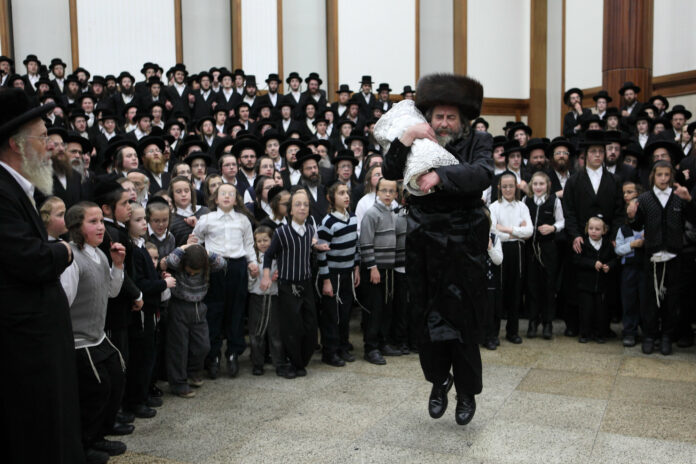
It is almost 1:00 a.m. on this unusually chilly August night—or rather morning—in Yerushalayim. I am standing outside the Rachmastrivka mosdos on Rechov Givat Moshe.
The limestone building with its three big arches over the entrance houses the main beis midrash, as well as Yeshivas Meor Einayim of Rachmastrivka. The lettering on the building explains that the mosdos are under the leadership of the Admorim Rav Chai Yitzchok Twersky, the Rachmastrivka Rebbe of the United States [this took place a mere few weeks before the passing of Rav Chai Yitzchok zt”l] and his nephew Rav Duvid Twersky, the Rachmastrivka Rebbe of Eretz Yisrael. During my short stay in Yerushalayim, I had tried to secure an appointment for a visit with the Rebbe—the gabbai called me one night at 11:00 p.m. asking if I could come right over—but I unfortunately arrived too late. But today I got a little more of a heads-up, so I made it here on time. I am not the only person waiting. A chasidishe couple is standing on the landing by one of the side entrances of this grand edifice. There are also some yungeleit seeking the Rebbe’s brachos and sage advice.
The Rachmastrivka chasidus is an offshoot of the Chernobyl dynasty and is unique amongst the great chasidic courts. Rav Yochanan Twersky, its founder, was the youngest son of Rav Mottele Twersky, the second Chernobyler Rebbe. After Rav Nuchem Twersky, the last surviving son of Rav Yochanan passed away, his two sons, Rav Avrohom Dov and Rav Duvid, were both crowned Rebbes of Rachmastrivka. However, they did not form two separate courts; the two of them led the chasidus in harmony and unison. All of the public events, tefillos and tishen were helmed by the two Rebbes. Such harmony, humility and selflessness are a rarity at any level. It was a middah they had inherited from their holy ancestor Rav Mottele of Chernobyl, who was known for his great humility.
This was not the last time that the chasidus would have two rebbes. Rav Duvid’s son, Rav Yochanan, would inherit the mantle from his father and uncle, and after his passing in 1982, his sons Rav Yisruel Mordche and Rav Chai Yitzchok would helm the humble, but respected chasidus. Rav Yisruel Mordche—or Rav Mottel, as he was lovingly known—led the chasidus in Yerushalayim, while Rav Chai Yitzchok led the chasidus in America. But even though the two Rebbes were in different physical locations, Rachmastrivka remained a single unified court. Rav Mottel’s court was smaller and more intimate. Although well respected, it didn’t attract much attention from outsiders. The tishen were attended primarily by Rachmastrivka chasidim, and the tefillos ran on schedule. But when the current Rebbes assumed his role, things began to change.
These days, the tishen draw very large crowds. In fact, many people from across the spectrum have been flocking to Rachmastrivka, and not just from other chasidic groups. The Rebbe’s tishen are filled to capacity with a kaleidoscope of different attire from shtreimels to black hats and more, in stark contrast to the tishen that were led by the Rebbe’s father. It is this broad appeal that brings me here tonight. What is it about Rachmastrivka that draws and inspires so many Yidden from such diverse backgrounds?
The Rebbe’s pashtus and humility are qualities for which he was known long before he was in the public eye. He used to sit in the Satmar beis midrash on Rechov Yoel and learn the entire day. It wasn’t unusual to see him having fallen asleep over a sefer. Many people who knew him didn’t know that he was the Rebbe’s son. He had no airs about him, and is still unassuming.
After his father’s passing, Rav Duvid was hesitant to accept the mantle of leadership; he wanted his uncle, Rav Chai Yitzchok from Boro Park, to lead the chasidus by himself. But the “Rebbe from America,” as Rav Chai Yitzchok was fondly referred to by the Rachmastrivka chasidim of Yerushalayim, insisted that he accept the mantle as the new Rachmastrivka Rebbe of Yerushalayim, soon after Rav Mottel’s levayah. In his first public address after the hachtarah, the Rebbe spoke about his initial reluctance and ultimate decision to accept the position. “I wanted my uncle to lead us from America, but he was concerned that our kehillah would fall apart if there wasn’t a Rebbe residing here.”
To read more, subscribe to Ami




















